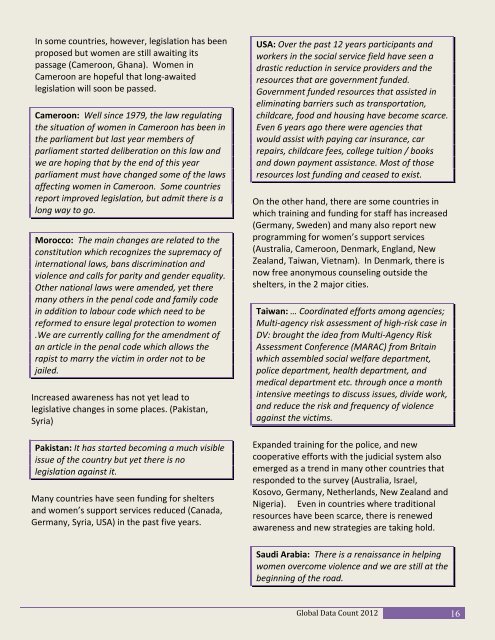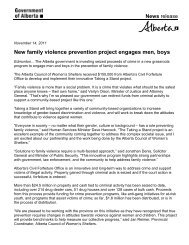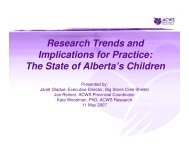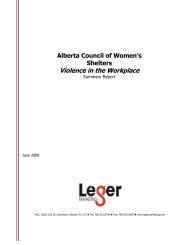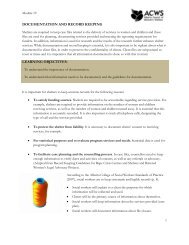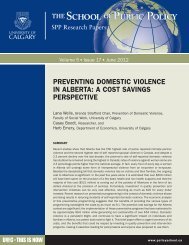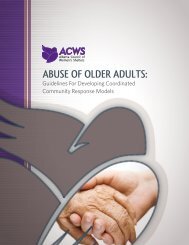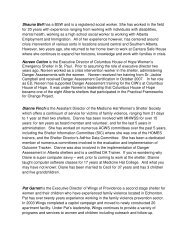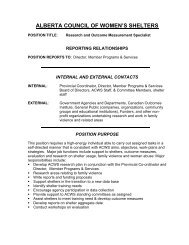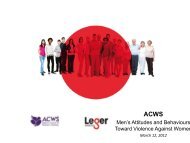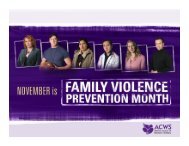Global Data Count Results - Alberta Council of Women's Shelters
Global Data Count Results - Alberta Council of Women's Shelters
Global Data Count Results - Alberta Council of Women's Shelters
- No tags were found...
You also want an ePaper? Increase the reach of your titles
YUMPU automatically turns print PDFs into web optimized ePapers that Google loves.
In some countries, however, legislation has beenproposed but women are still awaiting itspassage (Cameroon, Ghana). Women inCameroon are hopeful that long‐awaitedlegislation will soon be passed.Cameroon: Well since 1979, the law regulatingthe situation <strong>of</strong> women in Cameroon has been inthe parliament but last year members <strong>of</strong>parliament started deliberation on this law andwe are hoping that by the end <strong>of</strong> this yearparliament must have changed some <strong>of</strong> the lawsaffecting women in Cameroon. Some countriesreport improved legislation, but admit there is along way to go.Morocco: The main changes are related to theconstitution which recognizes the supremacy <strong>of</strong>international laws, bans discrimination andviolence and calls for parity and gender equality.Other national laws were amended, yet theremany others in the penal code and family codein addition to labour code which need to bereformed to ensure legal protection to women.We are currently calling for the amendment <strong>of</strong>an article in the penal code which allows therapist to marry the victim in order not to bejailed.Increased awareness has not yet lead tolegislative changes in some places. (Pakistan,Syria)Pakistan: It has started becoming a much visibleissue <strong>of</strong> the country but yet there is nolegislation against it.Many countries have seen funding for sheltersand women’s support services reduced (Canada,Germany, Syria, USA) in the past five years.USA: Over the past 12 years participants andworkers in the social service field have seen adrastic reduction in service providers and theresources that are government funded.Government funded resources that assisted ineliminating barriers such as transportation,childcare, food and housing have become scarce.Even 6 years ago there were agencies thatwould assist with paying car insurance, carrepairs, childcare fees, college tuition / booksand down payment assistance. Most <strong>of</strong> thoseresources lost funding and ceased to exist.On the other hand, there are some countries inwhich training and funding for staff has increased(Germany, Sweden) and many also report newprogramming for women’s support services(Australia, Cameroon, Denmark, England, NewZealand, Taiwan, Vietnam). In Denmark, there isnow free anonymous counseling outside theshelters, in the 2 major cities.Taiwan: … Coordinated efforts among agencies;Multi‐agency risk assessment <strong>of</strong> high‐risk case inDV: brought the idea from Multi‐Agency RiskAssessment Conference (MARAC) from Britainwhich assembled social welfare department,police department, health department, andmedical department etc. through once a monthintensive meetings to discuss issues, divide work,and reduce the risk and frequency <strong>of</strong> violenceagainst the victims.Expanded training for the police, and newcooperative efforts with the judicial system alsoemerged as a trend in many other countries thatresponded to the survey (Australia, Israel,Kosovo, Germany, Netherlands, New Zealand andNigeria). Even in countries where traditionalresources have been scarce, there is renewedawareness and new strategies are taking hold.Saudi Arabia: There is a renaissance in helpingwomen overcome violence and we are still at thebeginning <strong>of</strong> the road.<strong>Global</strong> <strong>Data</strong> <strong>Count</strong> 2012 16


